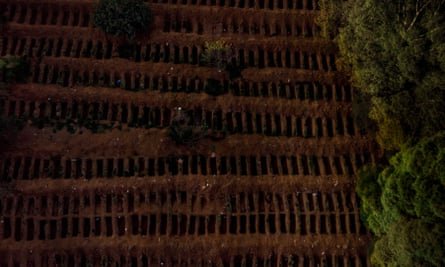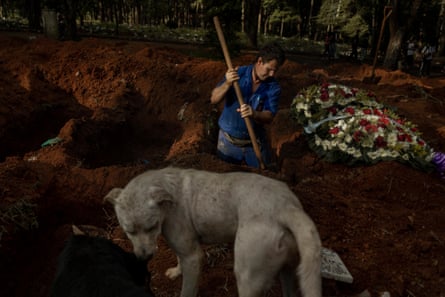Miguel Braga has done many things in life: sold lollipops, hawked cleaning products, guarded cars. This year, as Covid-19 shook Brazil, he turned his hand to burying bodies.
“Someone has to do it,” said the 30-year-old father-of-two, who earns £200 ($250) a month carving 2-metre x 1-metre resting places into the caramel-coloured soils of Latin America’s largest cemetery.
Dramatic aerial images of Vila Formosa have travelled the world in recent months – perhaps the most potent symbol of Brazil’s deadly failure to bring the coronavirus pandemic under control.
Less attention has been paid to its silent army of gravediggers, the final combatants in a lost war being fought against an illness that has killed more than 80,000 of Braga’s fellow citizens.
“The gravediggers are the invisible men of the pandemic,” said Rafael Vilela, a Brazilian photographer who has been documenting their travails.
In São Paulo alone, where Vila Formosa is located, more than 20,000 people are known to have died, meaning that if the state was a country it would rank as one of the world’s 10 worst hit, ahead of Iran, Peru and Russia.

Even in normal times, life is a battle for the 300 or so gravediggers who work in the state capital’s 22 cemeteries. “Alcoholism and depression are part and parcel of our work,” admitted Manoel Norberto, one of the directors of their union.
But this year has been particularly tough. Official figures – which confirm what gravediggers have been reporting anecdotally for months – show that in the first half of 2020 there was a 40% jump in burials compared with the same period of 2019, with 46,484 compared to 33,246 last year.
In May, São Paulo’s worst month, 9,796 burials were conducted, up from 5,799 last year – a rise of 69%. In June, 8,925 people were buried, compared with 5,884 last year.
“My shrink is a pack of cigarettes and a beer after work,” said Braga, after another punishing 11-hour shift during which he helped with more than 50 burials.
“The energy’s heavy. My wife says I toss and turn in bed. Sometimes I talk in my sleep,” he added. “But I’m a cool guy – for me, it’s a job just like any other.”
Braga was raised in a notoriously rough favela on the east side of São Paulo, the son of a metalworker and a maid. Growing up in the 1990s, when the city was notorious for police violence, he witnessed countless atrocities. “I come from a violent place, I’ve seen many corpses in the streets. This is something that’s part of my reality,” he said.

Even so, recent months have been painful at Vila Formosa, an 800,000 sq metre burial ground so vast that even some gravediggers have not fully explored it.
One Sunday in May, at the peak of São Paulo’s crisis, Braga helped bury 80 bodies in one shift, nearly all victims, or suspected victims, of Covid-19. Some weeks, workers have had to open 500 new graves, creating a total of 8,000 new resting places since the epidemic began.
“We suffer in silence,” admitted Luiz Silva, a veteran gravedigger, who said he and his colleagues felt a mix of sadness and angst at their work. “We’re afraid because we don’t know if we’ll be infected too.”
Paulo Lotufo, a University of São Paulo epidemiologist,hailed gravediggers as the unsung heroes of the pandemic: amateur disease detectives who helped grieving families while simultaneously helping track the virus’s progression and impact across Brazil.
Lotufo said it had been São Paulo’s overburdened gravediggers who first alerted him to the calamity in March, when the official death toll there was only about 20.
When the Amazon city of Manaus was plunged into chaos in April, it was again exhausted cemetery workers who raised the alarm, reporting more than a hundred daily burials rather than the usual 30.

“They’re my travelling companions,” Lotufo said of Brazil’s gravediggers, arguing that their frontline observations were now more crucial than ever as much of the country reopened and politicians massaged Covid-19 statistics to convince citizens the crisis was controlled.
Braga’s observations suggest the city of São Paulo may be through the worst, with the virus now advancing across its rural interior, as well as Brazil’s south and midwest. Some days, only 30 or 40 burials were taking place at Vila Formosa, the gravedigger said.
For all the heartbreak and suffering, Braga said watching the ceremonies of different faiths – a snapshot of Brazil’s religious diversity – was a moving experience.
“Followers of [the Afro-Brazilian religion] Candomblé throw popcorn on to the coffins to purify the dead. Umbanda followers seem to incorporate sacred entities. The evangelicals sing, but say it is only the flesh that is departing. And the Catholics chant prayers, which is what gives me goosebumps.”
Braga is an infrequent churchgoer, despite his wife being an evangelical pastor – but working as a gravedigger he found it impossible not to reflect on the fragility of human existence.
“I watch all these bodies being buried, with or without Covid, and I realize that we’re all just worthless,” he said.
“It doesn’t matter if you’re stupid or smart, if you’ve got money or not, if you’re handsome or ugly. The earth swallows us all.”
Additional reporting by Tom Phillips
Some of the names in this report have been changed to protect identities


 相关文章
相关文章



 精彩导读
精彩导读

)
.jpg?crop=1.777xh:h;*,*&downsize=510px:*510w)

 热门资讯
热门资讯 关注我们
关注我们
